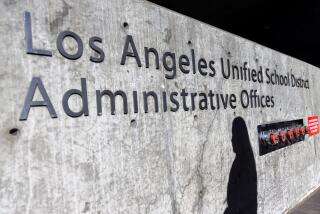Teachers Agree to Settle O.C. Investment Case
- Share via
SANTA ANA — A lawsuit that promised to put the ethics of the accounting profession on trial was settled for $14 million Tuesday, ending nearly four years of litigation but leaving some investors less than satisfied.
Just before a jury was to be selected, Big 6 accounting firm KPMG Peat Marwick agreed to pay nearly $10 million and Comerica Bank-California agreed to pay more then $4 million to end all litigation stemming from the 1994 collapse of Teachers Management & Investment Corp.
Teachers statewide lost $100 million in TMI’s collapse, and they blamed the Newport Beach company and its auditors, lawyers and bankers for allegedly propping the company up while the professionals collected fees.
TMI invested teachers’ money in dozens of real estate limited partnerships it oversaw. But it got caught in the excesses of the overheated market of the late 1980s, when soaring land prices started to cool and many investors lost everything.
Neither Peat Marwick nor Comerica, which ended up owning the original banking defendant, National Bank of Long Beach, admitted liability in settling.
Teachers who appeared in court Tuesday were glad the case is over. Some said the settlement appeared to be the best they could get, while others were unhappy with the results.
“I can’t describe the damage that has been done to the teachers and the minuscule amount being returned per investor,” said Stuart Halperin of Corona, a retired teacher and administrator in the Corona-Norco school system.
The teachers lost about $50 million in principal and more in interest. Together with past settlements, they’ll be getting back an average of 40 cents on each dollar invested, before paying attorney fees and costs.
Orange County Superior Court Judge John C. Woolley, who must approve fees and costs, will allocate the awards, making it unclear whether each investor will recoup the same amount. Woolley will be asked Thursday to give preliminary approval to the settlement.
The settlement also ends a similar fraud lawsuit brought by a receiver appointed by the court to manage and liquidate 30 real estate limited partnerships that TMI put together with investor money.
The settlement halts a case that was becoming increasingly watched nationwide by the accounting industry, which is working on an overhaul of its professional ethics rules about maintaining independence from audit clients.
About 20,000 teachers statewide had alleged that Peat Marwick had sacrificed its independence by failing to warn them that TMI was insolvent while collecting $2.5 million in fees for auditing their partnerships over three years.
In addition to Tuesday’s settlement, the teachers will reap an as yet undetermined amount from real estate that the receiver has been selling from each partnership, resulting in returns that can run from next to nothing to a substantial amount per partnership.
Teachers said they hope the market rebound over the last year will help the mostly undeveloped land recover much of its lost value.
The accounting firm’s payment is “a resounding recognition of Peat’s exposure to liability,” notwithstanding the fact that damages would have been difficult to prove,” said Ronald Rus of Irvine, trial lawyer for the teachers.
Damages became difficult to determine, he said, partly because the real estate market is rebounding, and the court receiver still has a dozen properties to sell.
In a prepared statement, Peat Marwick expressed a different view of the settlement.
“It is a vindication of our position that the plaintiffs’ claims were meritless,” Peat said. “If the plaintiffs thought they could have proven their allegations, they would have taken the case to trial.”
In an interview, Peat’s trial lawyer, Thomas Greene of Washington, called the settlement “prudent” because the accounting firm faced years of trials, uncertain results and appeals. Tuesday’s trial was the first of three that Peat would have defended.
Greene maintained, though, that Peat would have prevailed because none of the teachers even read Peat’s financial statements on TMI or their own partnerships before investing more money.
National Bank of Long Beach was accused of taking $1.5 million owed TMI in 1991 to cover loans owed by TMI owners James R. Martin and Maurice B. Shuman. The bank has since been sold several times, ending up as part of Comerica.
Earlier settlements earned the teachers $4 million from TMI and its owners and $2 million from the Newport Beach law firm of Bruck & Perry.
More to Read
Inside the business of entertainment
The Wide Shot brings you news, analysis and insights on everything from streaming wars to production — and what it all means for the future.
You may occasionally receive promotional content from the Los Angeles Times.










